Continue from first part of Dental Corrective Surgery here
Dental Veneer
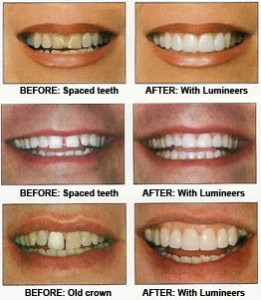
Before and after of dental veneer treatment @ websiteoptimization.com
Dental veneers are thin porcelain or resin composite material custom made to be bonded onto the surfaces  of your teeth to change their color, size, alignment, shape and length.
Procedure
The front part of the tooth has to be trimmed down a little to allow the veneer to be bonded. Porcelain veneer is more aesthetic than resin composite veneer as it is stain resistant and it mimics actual tooth due to its light reflection qualities.
Who needs it?
People with
- Uneven discolored teeth
- Chipped or fractured teeth
- Crooked teeth
- Heavily filled teeth
Cost
Generally, a dental veneer costs $500 to $1500 depending on areas, materials used and complexity of cases.
Caveat
Veneers are not as strong as dental crowns. You should not bite hard objects with your veneered teeth. If the porcelain veneer cracks it could only be replaced and not repaired. The color of the porcelain veneer never change, so if you plan to do teeth whitening please do so before having a dental veneer.
Dental Implant
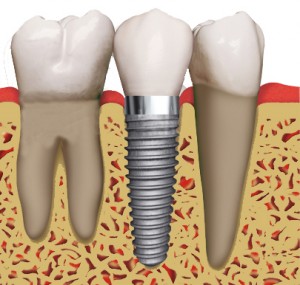
Dental implant @dentistportorange.com
When you are forced to extract your teeth there are few options on how to replace them. You can either choose removable dentures or fixed restorations. Mostly people would opt for fixed options as its longevity, esthetics and function are much more promising. Dental bridge and dental implant are wise choices.
To retrieve information on dental bridge please click here
Who needs it?
- People with missing teeth but with good oral health
- People who dislikes dentures
- People who wish to have a teeth replacement that is firm
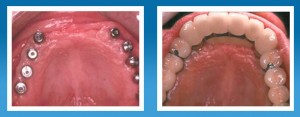
Before and after dental implant treatment for upper edentulous jaw @ 99dentalimplants.com
Dental implant is a titanium alloyed screw place inside the jaw to mimic the root of an extracted tooth. The dental implant is usually surgically placed inside the jaw and requires 3 to 6 months to bind with the jaw bone. When it is firmly attached to bone an abutment is placed on top of the implant which will then hold the crown or bridge or denture.
Dental implant could firm up a loose denture
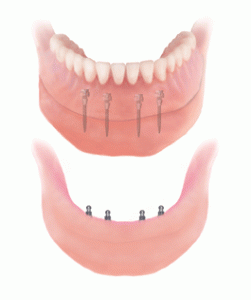
Denture stabilization with mini dental implants
A dental implant does not necessarily solely support dental crown or dental bridge. With 4 to 6 dental implants on an edentulous jaw it could support a full mouth denture as well. The denture usually snaps onto implants placed inside the mouth for additional hold. These attachments require routine adjustments.
Cost
The price of one unit dental implant ranges from $1300 to $3000. However, the whole treatment may cost up to $30,000 or more depending on the opted permanent restoration, complexity of the treatment, geographic considerations and additional surgeries or bone grafts required. Please get a full quotation from your dentist before you embark on having this treatment.
Caveat
Like any other dental restoration, meticulous oral hygiene measures are important. Should the area around the dental implant develop gum disease, jaw bone would shrink further and you would have periimplantitis. Consequently, your implant would become mobile and the restoration supported by it would collapse.
Corrective Jaw Surgery
It is also known as orthognathic surgery. It is often performed by oral surgeons or oral maxillofacial surgeons to correct skeletal and dental irregularities. The surgeons often work with orthodontists to achieve a balanced dentition with the correct jaw alignment.
Who needs it?
People who are
- Born with skeletal and dental deformities ( cleft lip and cleft palate)
- Severely protruding upper or lower jaw
- Open bite ( upper and lower front teeth could not meet )
- Difficulty in chewing, speech and breathing
- Head and Neck trauma due to accidents
- Chronic jaw pain
- Facial asymmetry
- Small or retruded chin
Why is it necessary?
Mostly, orthognathic surgeries are done to correct certain abnormalities for better aesthetic, function and quality of life.
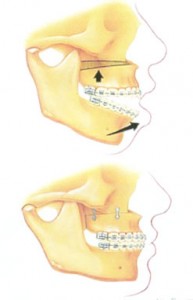
Jaw surgery to correct open bite @ pineypointoms.com
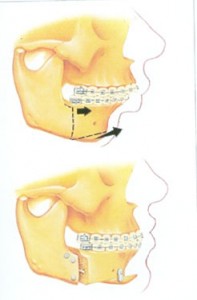
Jaw surgery to correct retruded lower jaw @ pineypointoms.com
Caveat
Usually after surgery, you would undergo post operative swelling, pain and recuperative period which differ from cases. It would disrupt your daily routine initially as you may need to take medical leave for some period of time. It is also important to understand the outcome of the surgery from your surgeon to prevent depression from over expectation or misunderstandings. Surgery could be life threatening sometimes so the surgeon would have a thorough body check up with you before the commencement of any surgical procedure.
Cost
The cost depends on the extent of treatment, expertise required and the area that you have your treatment. Insurance often covers accident cases. Your dental surgeon could always explain that without surgery the difficulties that you are having would affect your daily life to convince insurance coverage.
Conclusion
Dental corrective surgeries could give you a make over that would turn your life into a better one. Most importantly you must understand what you are doing and make the best choice for yourself.